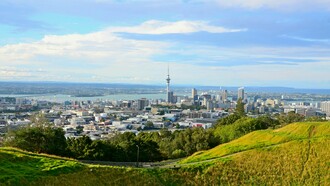US President Donald Trump has threatened to impose tariffs on Mexico to force it to stop illegal migration into the US.
Europe, typically, has a kinder and gentler approach. It is spending money – lots of money – and offering incentives to encourage private investors to invest in Africa. Their hope is that massive flows of public and private funds, together with incentives for African governments to reform their economies and business environments, will boost growth and thereby encourage would-be migrants to stay at home.
A German-led initiative, backed by the Group of 20 industrialised countries, is focusing on reforms and investment in 12 African countries that it considers strong candidates for growth.
Last October the German government pledged €1 billion for the project, which is known as the “Compact with Africa”. The government hopes that private firms will follow its example and invest their own funds in at least one of those 12 countries. The countries are: Benin, Burkina Faso, Côte d'Ivoire, Egypt, Ethiopia, Ghana, Guinea, Morocco, Rwanda, Senegal, Togo and Tunisia.
When she announced the €1 billion pledge, German Chancellor Angela Merkel emphasised that development requires private investment, not just government support. The funds from Germany will be used to finance European small and mid-sized enterprises (SMEs) that invest in Africa, as well as to provide direct equity financing to small African firms and to advise potential investors.
Now German political and business leaders are on the speaker circuit, hoping to generate private-sector interest in Africa. A conference in Frankfurt in late May, hosted by the Maleki Group together with the World Bank and the Frankfurt Chamber of Commerce and Industry, focused on how to encourage private firms to invest their money and expertise in Africa.
“The idea of the Compact with Africa is to ‘do well and then talk about it’, so that people can rely on it,” Jakob von Weizsaecker, chief economist of Germany’s Ministry of Finance, told the conference. He explained that African governments that improve their business climates, fight corruption and reduce public debt will become more attractive to foreign investors from Europe and elsewhere.
“Africa is focused on immediate needs, but it needs a broader focus on stable public finances to create conditions for growth,” said Dr Thomas Schaefer, Finance Minister of the German State of Hessen.
The 12 selected economies are targeted to become “African Lions” – growth economies that will provide a positive example to neighbouring countries, encouraging them to reform as well, Mr Weizsaecker said.
The “lions”, he added, are analogous to the four “Asian Tigers” – Taiwan, South Korea, Hong Kong and Singapore – that led Asia’s economic growth spurt between the early 1960s and the 1990s.
“Some countries in Africa will see an economic miracle in the next 15 year” Mr Weizsaecker predicted. As word of success at a business level spreads among investors, other companies will follow and invest in Africa, he added: “We need this kind of momentum to succeed. We expect that three or four or five ‘Compact’ countries will become true African lions.”
Realpolitik
Germany’s and Europe’s interest in promoting growth in Africa is not only due to the flow of impoverished illegal migrants from the south. The push is also based on geopolitical and economic considerations.
For one thing, European leaders hope to counter the growing influence of China, which has sent waves of investment funds to Africa and has laid claim to vast mineral resources there.
In addition, European leaders hope to match-up the vast quantities of un-invested savings in Europe with the massive needs for investment funds in Africa, to mutual benefit.
From a high-level political viewpoint, the marriage of European savings and African funding needs looks like a match made in heaven. Africa’s gross domestic product (GDP) growth rate will rise to 4.0% in 2019 and 4.1% in 2020, according to the African Development Bank. That’s about twice the rate of GDP growth in the European Union, which the EU estimates at 2.0% in 2019 and 1.9% in 2020.
Beyond that, Africa is young and dynamic and Europe – especially Western Europe – is increasingly old and grey. Worldometers, an independent statistical tracking service, says the median age in Africa is 19.4 years, compared to 41.8 years in Europe. As Western Europeans prepare in droves to retire, young Africans are out looking for work.
Yet at ground level, where investors make decisions, the reality of investing in Africa looks less promising. Private investors are in fact increasingly shying away from Africa. The United Nations Conference on Trade and Investment’s (UNCTAD) 2018 Report says foreign direct investment into Africa fell to $42 billion in 2017, 21% below the previous year. According to UNCTAD's newly published 2019 report, 2018 saw an uptick of 11% in investments, to $46 billion, but that was still below the annual average of the last 10 years (at about $50 billion). Of the ten top countries investing into Africa between 2011 and 2016, only four (the UK, Switzerland, France and Italy) are European.
Why are European investors so reluctant to run with the African “lions”?
“A term I use to describe the business environment in Nigeria is VUCA, Volatile, Uncertain, Complex and Ambiguous” said Ike Chioke, Group Managing Director of Afrinvest, an investment banking firm with a focus on West Africa. He spoke by video link from Lagos, Nigeria.
Nigeria’s Consul-General in Germany, Suleiman Dauda Umar, in effect acknowledging the problem, told the conference that his government is addressing security issues that keep investors away. “[We aim] to guarantee the safety of people who come to add value to our environment” he said.
Another issue for foreign investors is a dearth of investment by expatriate Africans, said Marc Lucassen, CEO of AHK Nigeria, the delegation of German industry and Commerce in Nigeria approximately 4% of the country’s GDP is sent in remittances, equivalent to about $28.4 billion per year, he said. “You get a sense of how much money is lying outside the country. Before Nigerians can ask for investment, they should themselves invest in Nigeria.”
Above all, African governments need to fight corruption and reduce red tape that hinders business. “We need to see policy reform and to improve the tax environment for the digital economy” said Eme Essien, country manager for Nigeria for the International Finance Corporation (IFC), a World Bank unit that offers investment and advisory services to encourage private-sector development.
Beyond the problems in Africa, European governments have had problems coordinating their efforts in the region, sometimes competing against each other for projects there, Mr Weizsaecker said.
In spite of all those barriers, German economic development officials remain optimistic about an African economic revival. “It’s an ambiguous picture, but I am still an optimist,” said Dr Thomas Duve, Director of South Africa and Regional Funds for KfW, a German state-owned development bank. “I think the African lions will move again.”















